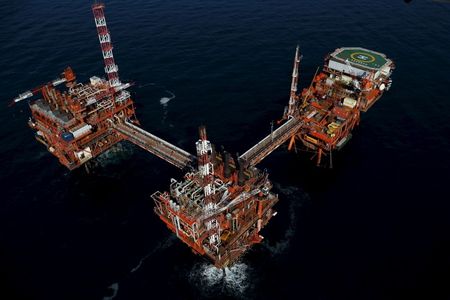Commodities
Oil prices retreat as dollar surges in wake of Trump election victory

Investing.com– Oil prices fell Wednesday, weighed by a surge in the dollar after Republican Donald Trump was elected president as well as a bigger than expected build in U.S. inventories.
At 07:30 ET (12:30 GMT), fell 1.6% to $74.35 a barrel, while fell 1.6% to $70.83 a barrel.
Trump returns to the White House
Donald Trump has been elected as the 47th president of the United States, returning to the White House for a second four-year term.
The Republicans have also taken a majority in the Senate, the upper chamber of the US Congress, and were also on track to win the House of Representatives, raising the possibility of a Republican sweep in the 2024 elections.
Such a scenario would present an easier path for Trump to enact major policy changes, which many have seen as inflationary, boosting the US currency. As a result the US dollar was on course for its biggest single-day uptick since March 2020 against its other major currency pairs.
A stronger U.S. dollar makes commodities denominated in the greenback, such as oil, more expensive for holders of other currencies.
Additionally, a Trump presidency could see policies that may further pressure the Chinese economy, weakening oil demand in the world’s top crude importer.
US inventories grow more than expected – API
Data from the , released on Tuesday, showed U.S. oil inventories grew 3.1 million barrels in the week to November 1, much more than expectations for a build of 1.8 mb.
Product inventories – gasoline and distillates – saw small draws.
The API data usually heralds a similar reading from , which is due later on Wednesday. The reading spurred some concerns that U.S. fuel demand was cooling, especially as the winter season approaches.
U.S. production is also expected to have remained near record highs of over 13 mb a day, keeping supplies in the country relatively high.
But U.S. oil production is expected to face some disruptions in the coming days, especially as energy firms began evacuating workers in the Gulf of Mexico ahead of Hurricane Storm Rafael, which is expected to make landfall in Louisiana later this week.
The storm strengthened into a category-1 hurricane on Tuesday.
Busy week continues
Oil prices were sitting on some gains in recent sessions, after the Organization of Petroleum Exporting Countries and allies, a group known as OPEC+, delayed plans to begin increasing production this year.
Beyond the US election, the focus this week is on a meeting of China’s National People’s Congress, where Beijing is widely expected to outline more plans for fiscal spending.
A is also due on Thursday, with the central bank widely expected to cut interest rates by 25 basis points.
(Ambar Warrick contributed to this article.)
Commodities
Oil prices rise; U.S. crude inventories plunge, Russia-Ukraine truce eyed
Commodities
India’s Reliance to stop buying Venezuelan oil over US tariffs, sources say
Commodities
Oil prices climb on Venezuela supply worries

 Forex3 years ago
Forex3 years agoForex Today: the dollar is gaining strength amid gloomy sentiment at the start of the Fed’s week

 Forex3 years ago
Forex3 years agoUnbiased review of Pocket Option broker

 Forex3 years ago
Forex3 years agoDollar to pound sterling exchange rate today: Pound plummeted to its lowest since 1985

 Forex3 years ago
Forex3 years agoHow is the Australian dollar doing today?

 Cryptocurrency3 years ago
Cryptocurrency3 years agoWhat happened in the crypto market – current events today

 World3 years ago
World3 years agoWhy are modern video games an art form?

 Commodities3 years ago
Commodities3 years agoCopper continues to fall in price on expectations of lower demand in China

 Economy3 years ago
Economy3 years agoCrude oil tankers double in price due to EU anti-Russian sanctions























